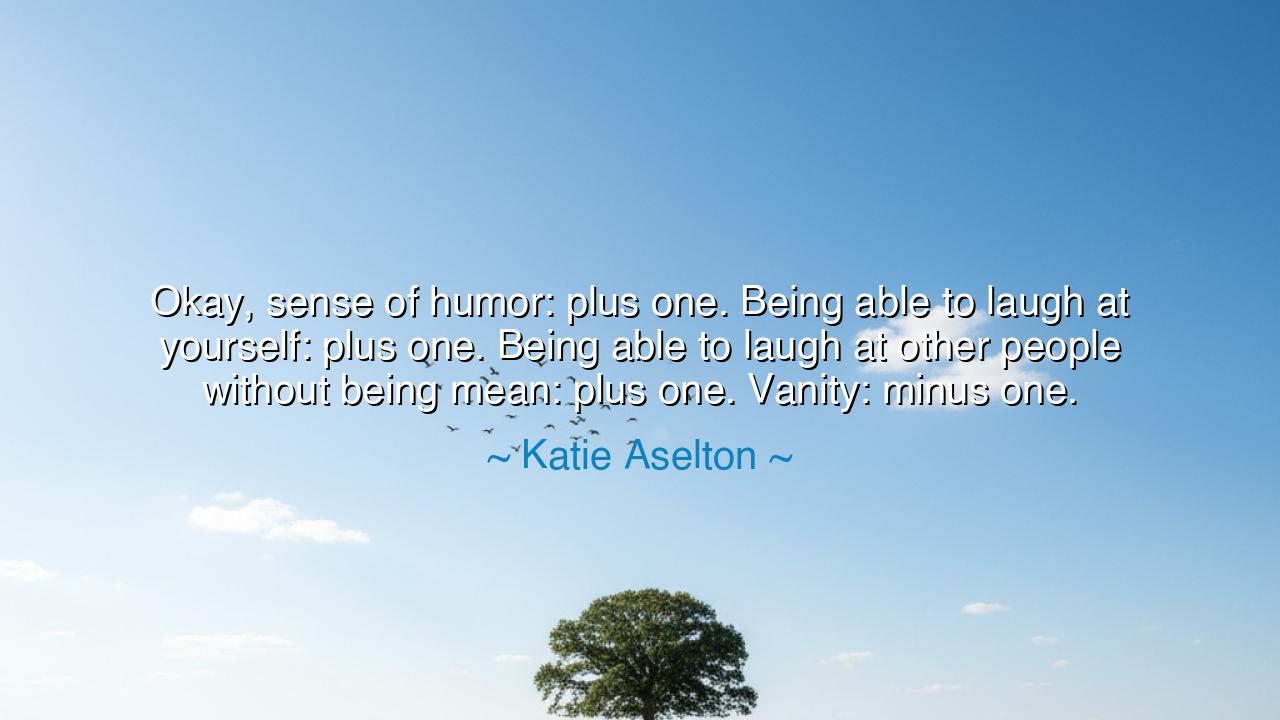
Okay, sense of humor: plus one. Being able to laugh at yourself:
Okay, sense of humor: plus one. Being able to laugh at yourself: plus one. Being able to laugh at other people without being mean: plus one. Vanity: minus one.






The words of Katie Aselton shimmer with the clarity of simple truth: “Okay, sense of humor: plus one. Being able to laugh at yourself: plus one. Being able to laugh at other people without being mean: plus one. Vanity: minus one.” Though she speaks in the language of modern jest, the spirit of her message is ancient — a teaching about humility, compassion, and the noble art of laughter. For laughter, when pure, is the breath of wisdom, and when tainted by cruelty, becomes its shadow. Aselton reminds us that the measure of one’s character is not in beauty or status, but in how one gives and receives joy.
In her playful tally — “plus one” and “minus one” — lies a moral arithmetic of the soul. A sense of humor, she tells us, is a virtue, a sign of openness and grace. To laugh is to breathe freely, to loosen the grip of pride, to recognize that life’s seriousness is often an illusion. Humor is not the enemy of depth; it is the companion of wisdom. The ancients knew this well. Even Socrates, in his dialogues, was known to jest with his students, teasing them toward enlightenment. For laughter opens where argument cannot — it softens the mind, making space for truth to enter. Thus, the first “plus one” is not trivial; it is the sign of a spirit at ease with the world.
But higher still is the gift of being able to laugh at yourself. This is the mark of true humility — the awareness that we, too, are imperfect, fallible, and funny in our striving. It is easy to laugh at the folly of others, but difficult to see our own missteps with tenderness. To laugh at oneself without bitterness is to master ego, to disarm pride before it grows into vanity. The great leaders of old understood this balance. Abraham Lincoln, in the depths of war, was known to tell jokes about his own awkwardness and plain looks. “If I were two-faced,” he once said, “would I be wearing this one?” In that gentle self-mockery, he disarmed tension, reminded others of his humanity, and strengthened their faith in him. Such humor is the armor of the wise — it protects the heart without hardening it.
Then Aselton speaks of the art of laughing at others without being mean. Here lies the moral challenge of the jester, the comedian, the storyteller. For laughter can both wound and heal. The ancients called this the “double edge” of the tongue — a gift that must be wielded with discernment. To find joy in the absurdities of humanity without cruelty is to stand in the company of the divine. It is to see others not as targets but as mirrors, reflections of our shared foolishness. The true humorist does not mock to elevate themselves; they laugh to remind us all that we are one.
But in the final line — “Vanity: minus one” — Aselton delivers her warning. For vanity is the poison of laughter. It distorts humor into mockery, wit into arrogance, joy into performance. The vain person laughs not to connect, but to dominate; they use humor as a weapon, not as a bridge. In the scrolls of history, how many kings and conquerors fell to this flaw! Nero, emperor of Rome, once fancied himself an artist, forcing his subjects to praise his performances under threat of death. His laughter echoed hollowly in a hall of fear. But laughter born of vanity cannot endure, for it feeds the self and starves the soul.
The lesson, then, is simple but profound: nurture humor, humility, and empathy, for they are the true jewels of character. Laugh daily, but never cruelly. When the world mocks you, smile — for self-awareness is freedom. When you see folly in others, let your laughter be kind — for compassion is strength. And when pride whispers that you are above laughter, remember Aselton’s counsel: minus one. For each act of vanity subtracts from the wholeness of your being, while every moment of humility adds light to your soul.
And so, dear listener, let this teaching dwell in your heart: humor is the music of the wise, but only when played upon the strings of kindness. Laugh at yourself, lift others with your mirth, and guard your heart against the vanity that corrodes joy. For the one who can laugh gently — at their flaws, at life’s absurdity, at the dance of fate — walks the path of serenity. As Aselton teaches in her modern tongue, the arithmetic of the soul is clear: humor and humility multiply; vanity divides. Choose, therefore, the laughter that heals, and in that laughter, you will find peace.






AAdministratorAdministrator
Welcome, honored guests. Please leave a comment, we will respond soon